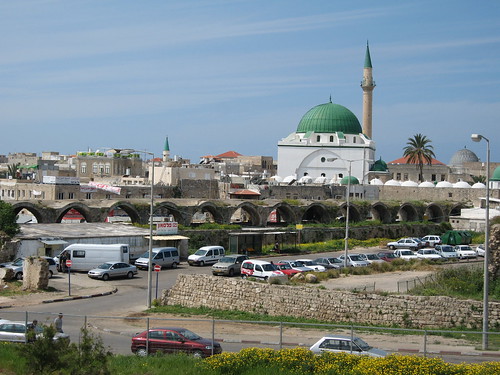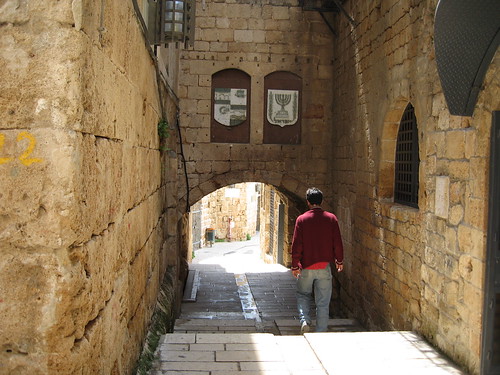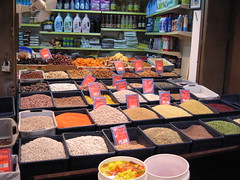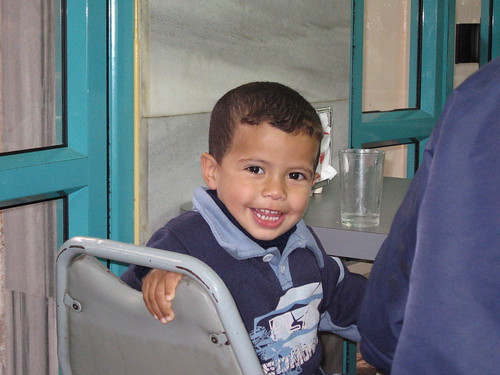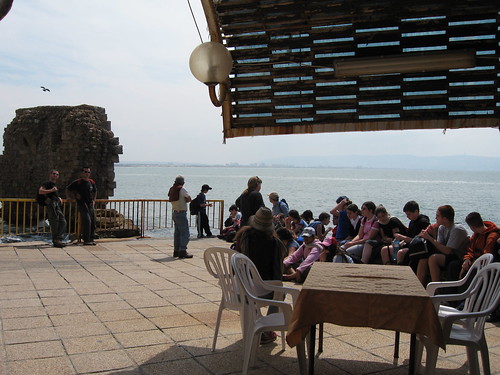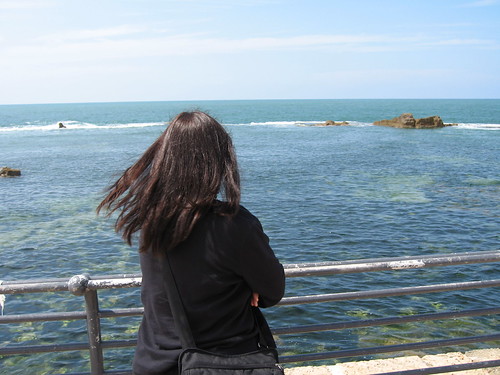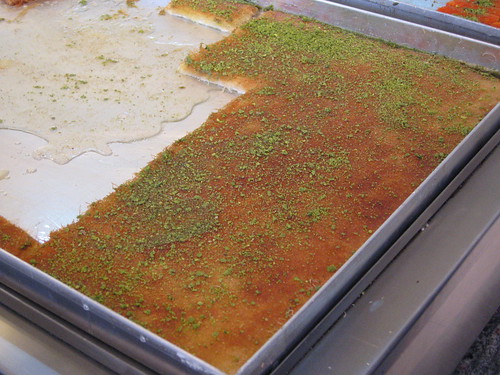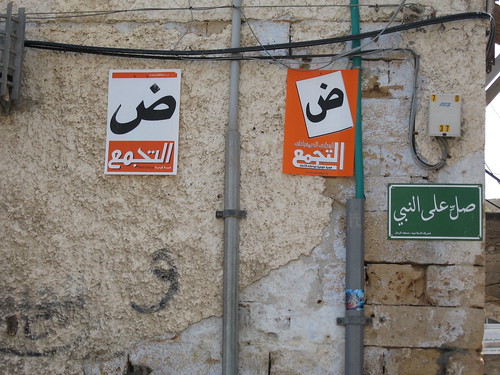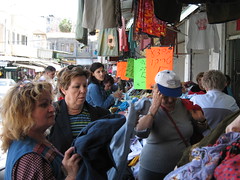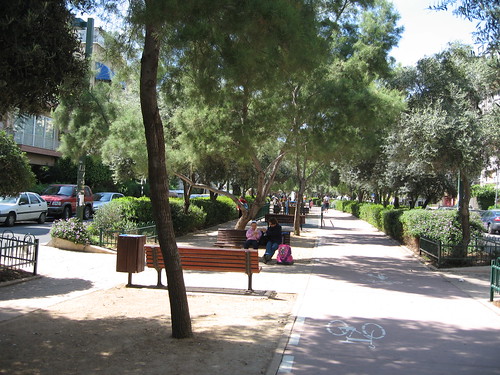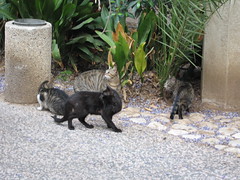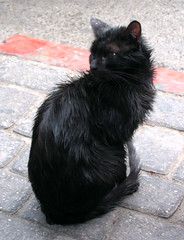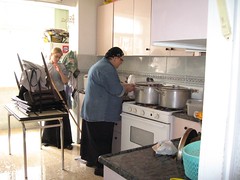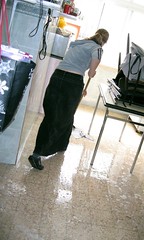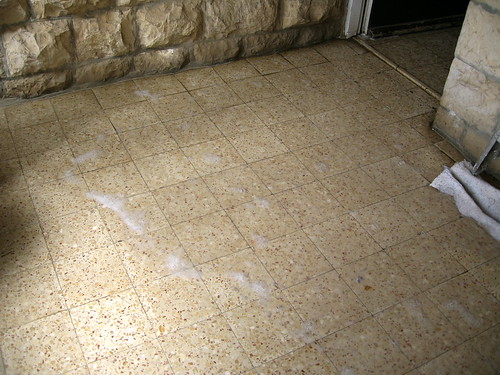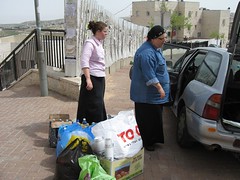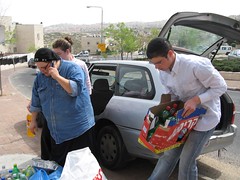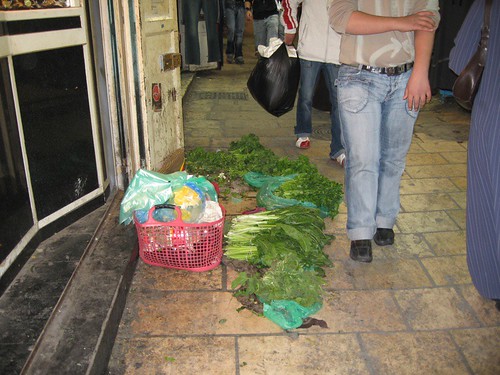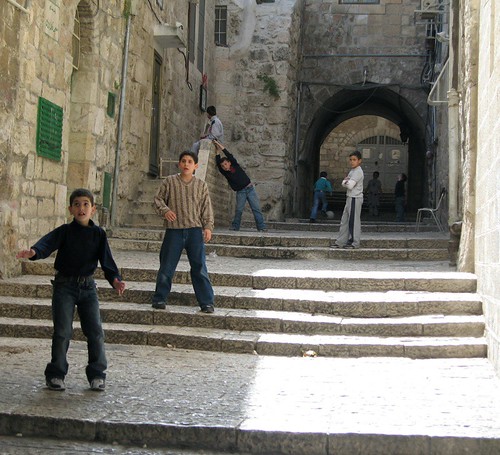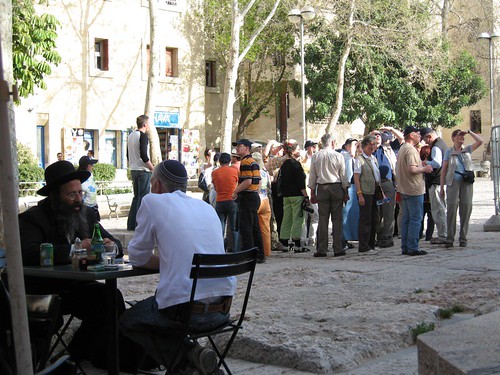When I was helping set up for dinner on Friday, I took a picture through a window in the Yeshiva. Adina saw me and asked, "Are you taking a picture of the wall?" I hadn't even realized it was there. So close.
This is the picture I was taking:
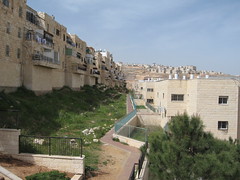
I said, "I guess I am, but I didn't know it. So is that an Arab town on the other side?"
After Adina pointed out the presence of the wall, I took a second picture:
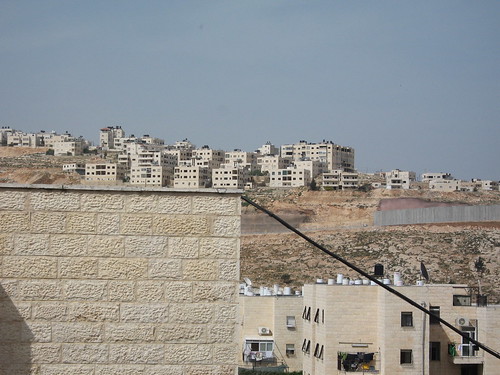
"Yes, but there are also some Jewish towns on the other side."
"Oh, so is that a problem? Can they get across?"
"I don't know. Maybe."
I asked, "What do you think about it?"
She said, "I think it's ugly."
I laughed. "I agree. But are you for it or against it?"
"I don't know. I not sure what I think. I'm nothing."
I said, "I'm not sure you can be nothing on this. You know, my friend, Spesh, is very against it. He does a lot of protesting and work against it."
"Well, give him my number; maybe he can convince me."
I like this kid; she's a good sport. And funny. And not so much a kid anymore--she's 18. I like that everyone in my family has a good sense of humor; it helps bridge the cultural divide.
Saturday meant more entertaining in the same makeshift dining hall. Lunch was to be served at 11:00am. But "Kiddush" was available at 9:30am. I woke up in time to be there and help out. A light-ish supper was served at 5pm. Yes, it was a lot of eating. Luckily, my sister-in-law is a very good cook, so I liked almost everything she served.
A very cute phenomenon was the way the little kids (girls and boys) lined up to help set up the tables. Before people sat down, common dishes with salads were placed on the tables. My nieces worked in the kitchen dishing them out and plating the other courses. The little kids would come in and get instructions: two of these at each table. On Saturday, there wasn't as much to place, but I made one little boy's day by handing him a bowl of potato chips to put out on the table. He gave me a big smile as headed out to do his job. That particular boy was one of 12 children.
I expect little kids to be a little shy when they first meet me. It's a good instinct. But, usually, kids warm up to me and start smiling in just a few minutes. That was not the case with the orthodox kids. They all regarded me with suspicion upon first meeting and would turn the other way or hide behind their mothers. They might not run away but just look at me blankly--no smile at all. After two or three meetings with a kid, they might warm up to me, but there were a couple who never did.
I'm not sure when I asked my brother these questions--it was either Friday night or Saturday afternoon, but I finally got some answers. The first was about the name for the meals we'd been having all week, "Sheva Bruchas." I asked him what it meant. "Literally, 'seven blessing.'"
"That's what I thought!" I found out that at each meal you recite seven blessings; there can be any number of celebratory meals.
"Didn't you notice that we were taking turns saying the blessings?" My brother asked.
"I noticed last night, but at the other meals the men were sitting separately and I couldn't rally tell what was going on."
"Ah. Well, the first blessing is the 'boray pre hagafen' [the blessing over the wine]."
"That one I got. But the others?"
"The other six are specifically related to the wedding--they're for the couple. So there is one glass of wine for the 'pre hagafen' and another glass of wine for the other blessings."
"Can I ask you about something else?"
"Of course."
"Well, " I said, "on my walk around residential Jerusalem the other day, I saw bread a few times, left out next to the trash, wrapped up in a bag. Do you know what that's about?'
Guess what? He
did know. "Ah, good question. That's because bread is treated differently than other kinds of trash because bread is life--it's the staff of life--so you can't throw it in with the rest of the trash. You have to wrap it up. Some people feel that isn't enough, so they don't even put it in the garbage can."
"But won't it just go into the trash anyway? The trash men will just put it in..."
"Right. We just wrap it before we throw it away."
I'm not surprised--you don't push those things off to other people. It has to get into the trash anyway--if you've wrapped it, that's sufficient.
None of the 'secular' Jews I talked to had ever heard of this practice before. Please consider me the Reform knowledge repository of obscure Orthodox practices.
The meal on Saturday was a bit more relaxed than things on Friday night. No food preparation was involved, just dishing things out.
After lunch, I was completely exhausted and went to lie down. The room the family had given me was tiny, near the front of the house. I believe it was Yehuda's old room. I shut the door and read for a bit and then closed my eyes. I don't think I fell asleep.
Dad wanted to go for a walk with me, but I declined. I was feeling annoyed with him, but I can't remember exactly why. I figured he'd ask me a bunch of intrusive questions and I wasn't in the mood for that. Ora (oldest niece, age 19) went with him instead. I sat around the house for a while, reading, and then I walked outside. I encountered a little girl whose name I never learned, who was a niece of the bride's. She and I had trouble communicating due to no common language, but I'd picked up a couple words of Hebrew by then ("come," "here") along with the phrase my nieces taught me, "Ani doda shel Yehuda," which means, "I am Yehuda's aunt." I also used, "Ani ahot shel Avram Shimon." That means, "I am Avram Shimon's sister" Avram Shimon is my brother's Hebrew name, but I always call him by his English name.
So, the little niece of Avital was looking longingly at the playground across the street. She lead me there, a little annoyed that I didn't speak any Hebrew. We found my youngest niece there, playing with a friend. The four of us hung out for a while and met another boy, Yankee (nickname for Yaacov), who is 5 and a friend of the family. The girls played without me some of the time, but called in my assistance when they encountered a playground bully. They made me stand by and look at him. That didn't stop him from kicking the little niece in the rear. Yikes. My youngest niece took that moment to say, "Let's go home" (in English), so we all did.
We found Susan there, and Dad came home not long after. Yankee is one of the chattiest five-year-olds I've ever met and I dearly wish I could have understood him. At one point he ran out and came back with a picture book that had Hebrew words (with vowels!) under the pictures. A picture dictionary. What a smart kid.
My problem with Hebrew is that I should know it, or at least know a lot more than I do. I can identify the letters and their sounds--I can even recite the Hebrew alphabet due to years of Sunday school. I can say a lot of prayers, but I can't translate them. Most Hebrew on signs and in books is written without vowels, so I'm really lost. Only kiddies need vowels. The picture book was great and if Yankee had actually let me study it, I might have learned something other than that the Hebrew word for "tank" is "tank." And that "sofa" is "sofa." Oh well.
We mobilized for the next meal, after which we Americans were going to depart--for good. Dad and Susan to get on a plane, me to spend some more time with Spesh.
The last meal was even lighter and more sparsely attended than the lunch hour meal. It lasted until the end of the Sabbath.
Oh, and in case you didn't know, during Shabbos, which lasts from sunset Friday to sunset Saturday, you can't do many, many things. You can't drive, which is why we spent Friday night at my brother's house. You can't tear things (like toilet paper--there are special packets of single sheet paper set out for Shabbos), you can't turn anything on or off. If something is on, you may leave it on. In most homes there is a gas range and one burner is left on at a very low heat for the entire period. The use of timers for is acceptable. You can't spend money. You can't smoke or use the telephone. You can't carry things outside of a specifically designated area. And much, much more. It would be relaxing it if it weren't so restrictive.
Another meal, even more of a blur than usual. Hasty departures--I don't think the family realized it was the last time they would see me. I hadn't been so sure either, but I wasn't going to have time to come back to Jerusalem. Yehuda made it a point to ask us to send his and Avital's love to my other brother, his wife and all of his kids in New Jersey.
Dad drove us home and he and Susan packed to get ready for their early morning departure. They had to leave by 4:30am to be at the airport in time for their flight. I had more leeway. I called Spesh and made plans to meet him in Tel Aviv. We decided I would take the train because it was a pretty ride.
I lent Dad and Susan the computer for one last email check and chatted pleasantly with them until around 10pm when they were going to try and sleep. I don't think I did much of anything after that, not even writing wise. I'm sure I watched a movie on tv. There were just way too many uncut movies on digital cable to resist.

